DUESSELDORF, Germany (Reuters) - Metro AG (DE:MEOG), Europe's fourth biggest retailer, said Christmas trade had started to pick up in December after a slow start to sales of food and textiles in Germany last month, which it blamed in part on unusually mild weather.
Metro shares were hit by concerns over the impact on its Russian business of a new fall in the rouble on Tuesday despite a sharp overnight interest rate increase.
Fears over Russia and the mixed picture on Christmas trading overshadowed quarterly operating profit which beat expectations after a recovery in its consumer electronics business.
Metro, which is Russia's fourth-biggest retailer behind X5 (L:PJPq), Magnit
Metro earlier this year halted a stock market listing of a stake in its Russian wholesale operation due to the Ukraine crisis. Chief Executive Olaf Koch said the business continued to see stable sales in local currencies but said Metro was not currently working on reviving the listing plan.
Metro reported that operating profit before special items fell 4 percent to 418 million euros (331.53 million pounds) in the final quarter of its 2013/14 fiscal year, beating an average analyst forecast for 369 million.
The figure was helped by a better-than-expected performance from its troubled consumer electronics unit Media-Saturn which Metro had already flagged when it reported sales of 15.1 billion euros for the July-September quarter.
Metro said it expected "satisfactory" Christmas trading, with business starting to pick up in the first two weeks of December after a slow November in its home market, with both its cash-and-carry and Media-Saturn seeing growth.
Metro said it expected a "slight" rise in sales and earnings for the 2014/15 financial year that started in October despite "the persistently challenging economic environment".
"Metro's results statement was reasonably encouraging," Barclays analysts wrote in a note. "Of course, the weakness in the Russian currency means that there is likely to be a significant gap between the underlying performance and the performance in current terms."
The sprawling German group, which runs cash and carries, supermarkets, department stores as well as Europe's top consumer electronics chain, is in the midst of slimming down its portfolio and cutting costs to try to revive its fortunes.
Metro said recent disposals should enable it to invest in future growth and strengthen its balance sheet, with net debt down 736 million euros year-on-year to 4.7 billion at Sept. 30.
Metro, which did not pay a dividend last year, has proposed resuming payments at a level of 0.90 euros per share.

(Editing by Keith Weir)